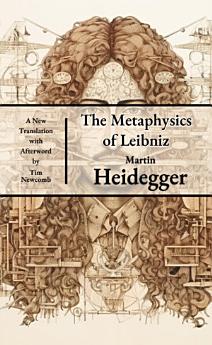The Metaphysics of Leibniz
Mey 2024 · The Collected Early Works of Martin Heidegger Ibhuku elingu-23 · Minerva Heritage Press
I-Ebook
90
Amakhasi
family_home
Kufanelekile
info
reportIzilinganiso nezibuyekezo aziqinisekisiwe Funda Kabanzi
Mayelana nale ebook
A new translation of Martin Heidegger's early work "The Metaphysics of Leibniz", originally published in 1923 as the last of his Marburg lectures. This edition contains a new afterword by the Translator, a timeline of Heidegger's life and works, a philosophic index of core Heideggerian concepts and a guide for terminology across 19th and 20th century Existentialists. This translation is designed for readability and accessibility to Heidegger's enigmatic and dense philosophy. Complex and specific philosophic terms are translated as literally as possible and academic footnotes have been removed to ensure easy reading. This lecture was given in the summer semester of 1928 as an examination of Leibniz. The first Marburg semester of 1923/24 dared the corresponding discussion with Descartes, which was then included in "Being and Time" (§§ 19-21), and here he concludes his series on Continental Metaphysics. Heidegger focuses on the essential qualities of the monad, especially its aspects as "vis primitiva," "substantia," and "monas," and how these elements contribute to the understanding of being and substance in Leibniz's philosophy. Heidegger interprets the monad as a fundamental unit of being that encompasses both unity and multiplicity, a concept deeply rooted in Leibniz's metaphysics. In doing so, he engages with the concept of the "substantiality of substance" and examines the nature of being as understood by Leibniz and its implications for the broader philosophical discourse. Heidegger's analysis delves into the dynamic nature of the monad, characterized by its inherent "urge" ("Drang") and its ability to unify and manifest reality. He closely examines the relationship between the monad's internal structure and its external expression in the world, emphasizing Leibniz's distinction between the internal and external aspects of being. This discussion extends to the metaphysical implications of monadology, where Heidegger addresses how individual monads reflect the complexity and diversity of the universe.
Mayelana nomlobi
Martin Heidegger (1889-1976) was a German philosopher and one of the most influential thinkers of the 20th century, particularly in the fields of phenomenology, existentialism and Ontochronology. His seminal work, Being and Time (Sein und Zeit), introduces the concept of "Dasein," or "being-there," as a way to explore the nature of human existence, focusing on temporality and the meaning of being. Heidegger challenged traditional Western metaphysics by emphasizing the situatedness of human beings within their world, a concept he described as "being-in-the-world." Though his brief association with the Nazi party has cast a shadow over his legacy, Heidegger's ideas have profoundly impacted disciplines such as philosophy, psychology, literature, and theology. His critiques of technology and "technological thinking" continue to resonate in contemporary discussions on modernity, alienation, and the essence of human existence.
Nikeza le ebook isilinganiso
Sitshele ukuthi ucabangani.
Ulwazi lokufunda
Amasmathifoni namathebulethi
Faka uhlelo lokusebenza lwe-Google Play Amabhuku lwe-Android ne-iPad/iPhone. Livunyelaniswa ngokuzenzakalela ne-akhawunti yakho liphinde likuvumele ukuthi ufunde uxhunywe ku-inthanethi noma ungaxhunyiwe noma ngabe ukuphi.
Amakhompyutha aphathekayo namakhompyutha
Ungalalela ama-audiobook athengwe ku-Google Play usebenzisa isiphequluli sewebhu sekhompuyutha yakho.
Ama-eReaders namanye amadivayisi
Ukuze ufunde kumadivayisi e-e-ink afana ne-Kobo eReaders, uzodinga ukudawuniloda ifayela futhi ulidlulisele kudivayisi yakho. Landela imiyalelo Yesikhungo Sosizo eningiliziwe ukuze udlulise amafayela kuma-eReader asekelwayo.











